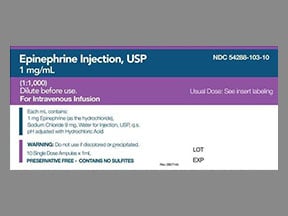
Epinephrine Pf Coupons & Savings Card – Discount Prices from $7.14
Epinephrine, also known as adrenaline, is a hormone and neurotransmitter produced by the adrenal glands. It plays a crucial role in the body's "fight-or-flight" response, preparing the body to react to stressful situations. Medically, epinephrine is used to treat severe allergic reactions (anaphylaxis), cardiac arrest, asthma attacks, and as a vasopressor to increase blood pressure in certain critical conditions. It works by stimulating alpha and beta-adrenergic receptors, leading to increased heart rate, muscle strength, blood pressure, and sugar metabolism. Common side effects may include anxiety, dizziness, sweating, and palpitations.
Our coupons are free to use. Before paying, show the pharmacist your Epinephrine Pf savings card to get your free discount. Use our filters below to edit the prescription box to match your needs. The Epinephrine Pf prices will update based on your prescription needs. Above our Epinephrine Pf coupons, you can change your location to see pharmacy prices and costs in other areas. We're here to help you buy Epinephrine Pf at the lowest price with our prescription discount card.
My prescription
Edit
1ML of 1MG/ML, Epinephrine Pf (1 Ampule)
Select pharmacy

CVS
$30.11
COUPON PRICE
Walgreens
$7.14
COUPON PRICE
Walmart
$9.01
COUPON PRICE
Albertsons
$10.65
COUPON PRICEEpinephrine Pf savings card
Show this card to your pharmacist
Walgreens
$7.14
BIN
ID
PCN
GRP
019876
LH24116FB7
CHIPPO
LHX
Powered by
Epinephrine, also known as adrenaline, is a hormone and neurotransmitter produced by the adrenal glands. It plays a crucial role in the body's "fight-or-flight" response, preparing the body to react to stressful situations. Medically, epinephrine is used to treat severe allergic reactions (anaphylaxis), cardiac arrest, asthma attacks, and as a vasopressor to increase blood pressure in certain critical conditions. It works by stimulating alpha and beta-adrenergic receptors, leading to increased heart rate, muscle strength, blood pressure, and sugar metabolism. Common side effects may include anxiety, dizziness, sweating, and palpitations.
Our coupons are free to use. Before paying, show the pharmacist your Epinephrine Pf savings card to get your free discount. Use our filters below to edit the prescription box to match your needs. The Epinephrine Pf prices will update based on your prescription needs. Above our Epinephrine Pf coupons, you can change your location to see pharmacy prices and costs in other areas. We're here to help you buy Epinephrine Pf at the lowest price with our prescription discount card.
Epinephrine Pf dosage forms
Use our Epinephrine Pf 1ML coupon with prices from $7.14 for 1 Ampule. You can also use our Epinephrine Pf 1ML coupon with prices from $13.80 for 2 Ampules. We have a Epinephrine Pf 1ML coupon with prices from $16.95 for 3 Ampules.
Dosage Quantity Price from Per unit 1ML 1 Ampule $7.14 $7.14 1ML 2 Ampules $13.80 $6.90 1ML 3 Ampules $16.95 $5.65
| Dosage | Quantity | Price from | Per unit |
|---|---|---|---|
| 1ML | 1 Ampule | $7.14 | $7.14 |
| 1ML | 2 Ampules | $13.80 | $6.90 |
| 1ML | 3 Ampules | $16.95 | $5.65 |
